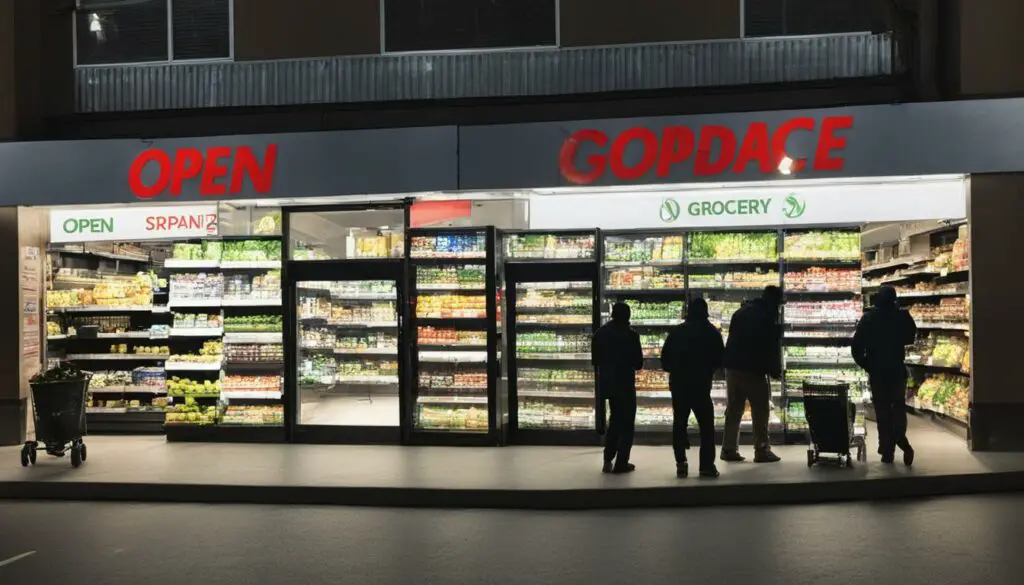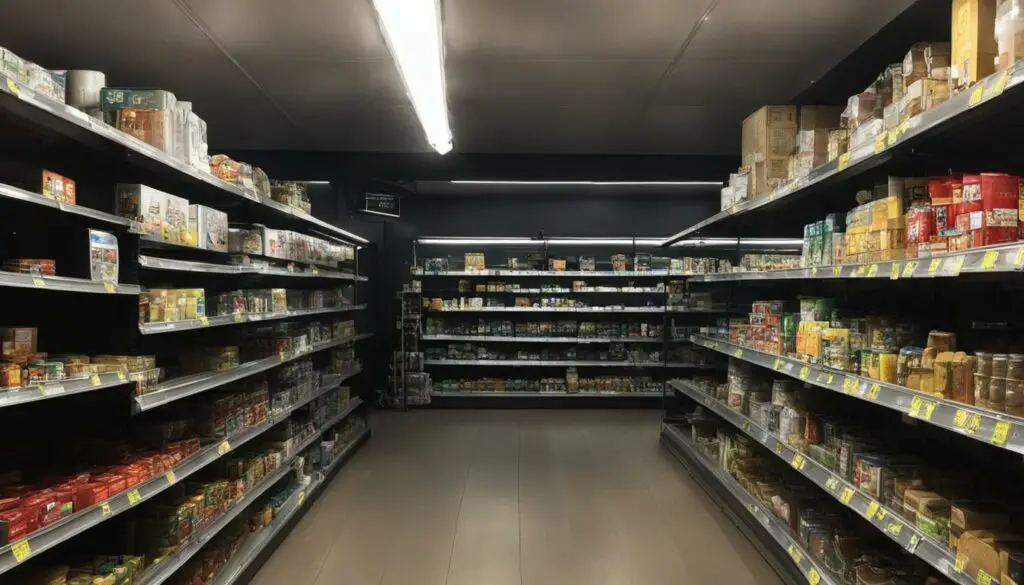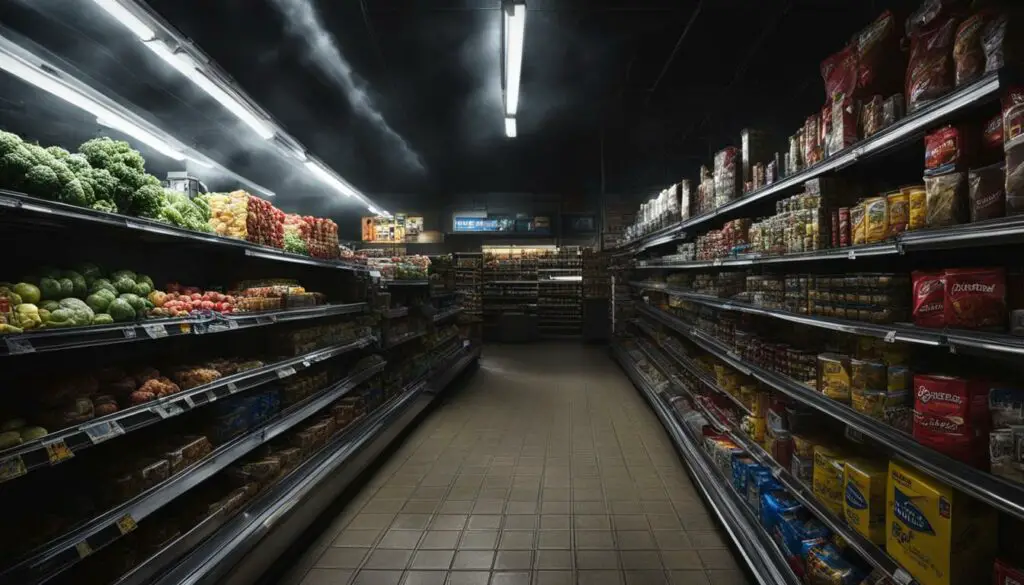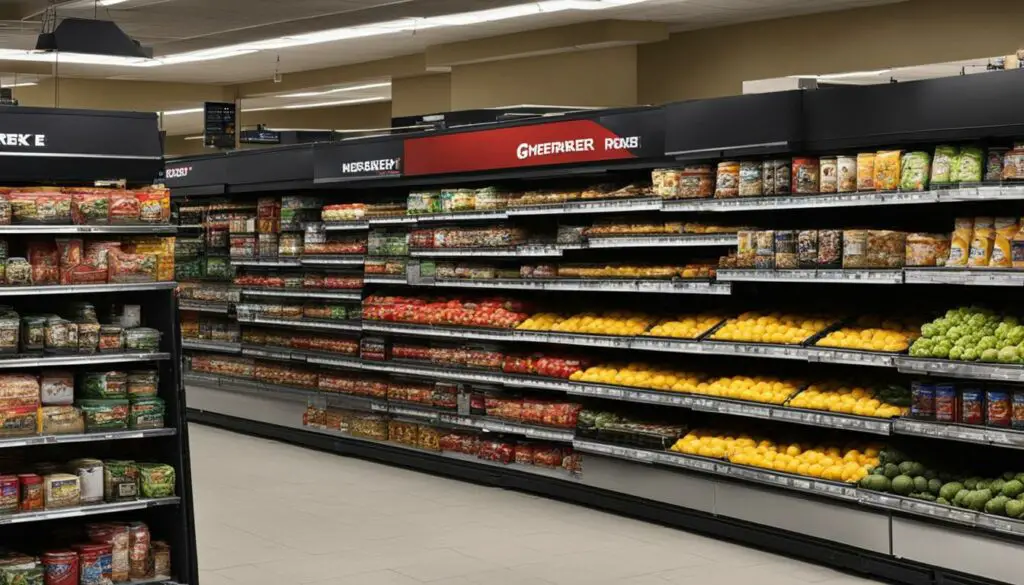Originally posted on December 25, 2023 @ 4:59 pm
When a power outage occurs, it can disrupt the operations of various establishments, including grocery stores. But the question remains: do grocery stores have backup generators to ensure uninterrupted service? Let’s explore this topic and discover how grocery stores handle power outages and the challenges they face.
Grocery stores are essential for providing food and supplies to communities, and it’s crucial for them to have backup power systems in place. However, the reality is that most larger supermarkets and grocery stores do have backup generators, but these generators are typically not capable of running large refrigeration equipment.
Why is that the case? The answer lies in the substantial power requirements of grocery stores. To power the entire store indefinitely, a large generator would be required, but the cost of such a generator outweighs the benefits. Power outages in grocery stores are relatively rare and brief, making it impractical to invest in a generator that can sustain the entire store.
Despite this limitation, grocery stores prioritize the safety of their customers and the preservation of perishable goods. They have established procedures in place to minimize product waste and ensure customer safety when a power outage occurs. Let’s take a closer look at how grocery stores handle power outages and the measures they take to address the challenges.
Table of Contents
Key Takeaways:
- Most grocery stores have backup generators, but they are not capable of running large refrigeration equipment.
- Grocery stores have procedures in place to minimize product waste and ensure customer safety during power outages.
- A backup generator provides power for essential systems like emergency lighting and cash registers.
- Grocery stores may close temporarily during power outages to prevent product loss and maintain customer safety.
- Food spoilage can occur within a short period during a power outage, and grocery stores follow USDA guidelines for discarding items.
What Do Grocery Stores Do When the Power Goes Out?
When a power outage strikes a grocery store, there are established procedures in place to minimize product waste and ensure customer safety. Store employees swiftly act to maintain control and protect perishable items. The following measures are commonly taken:
- Ushering customers out of the store in an organized manner to prevent panic and congestion.
- Using caution tape to block access to freezer and cooler doors, preventing customers from opening them and increasing the temperature inside.
- Closing open refrigerated cases with pull-down vinyl curtains to help preserve the cold temperature.
- Discarding prepared hot food items that cannot be kept at a safe temperature.
While backup generators can be expensive and grocery stores operate on low-profit margins, stores equipped with generators typically have emergency power for essential functions. This includes providing power for emergency lighting, cash registers, and computer servers, allowing the store to continue serving customers to the best of their ability.
“During a power outage, our top priority is the safety of our customers and maintaining high-quality products. We have trained our employees to follow specific protocols to ensure minimal product waste and a safe environment for everyone.” – Store Manager, XYZ Grocery
Can a Grocery Store Stay Open Without Power?

While a grocery store can technically stay open without power, it is not practical or safe for both customers and the store itself. Without electricity, the store would be shrouded in darkness, posing a hazard to customers navigating through the aisles. Even with a backup generator, certain essential functions cannot be adequately supported, leading to potential risks and challenges.
One significant issue is the storage of perishable food items. Without power, refrigeration systems cannot maintain the required temperatures, increasing the risk of spoilage and potential health hazards. It is crucial to ensure that food products, especially those that require specific temperature controls, are appropriately stored to maintain their quality and safety.
Another challenge arises from the lack of internet access during a power outage. Without connectivity, grocery stores may face difficulties in accepting credit card payments, affecting their ability to complete transactions. This can result in inconvenience for both the store and its customers.
The potential for theft also increases during power outages. The initial chaos and decreased employee attention provide opportunities for shoplifting. In the absence of proper lighting and security measures, grocery stores become more vulnerable to theft and other criminal activities.
Considering all these factors, it is generally in the best interest of grocery stores to close temporarily during power outages. By doing so, they can prevent product loss, ensure customer safety, and focus on resolving the power issue efficiently. Prioritizing the well-being of their customers and maintaining the quality and integrity of their products are top concerns for grocery retailers.
To fully understand the challenges that grocery stores face during power outages, let’s explore some specific scenarios and the potential consequences:
- The store remains open without electricity:
- Issue: Limited visibility makes it unsafe for customers to navigate the store. Increased risk of accidents and injuries.
- Risk: Perishable food items cannot be stored at appropriate temperatures, leading to spoilage, potential health hazards, and financial loss.
- Challenge: Lack of internet access hinders credit card transactions, causing inconvenience for both customers and the store.
- Potential consequence: Increased likelihood of theft and security breaches due to reduced lighting and employee attention.
- The store relies on backup generators:
- Issue: Generators may not provide sufficient power to meet all the store’s needs, resulting in limited functionality.
- Risk: Despite backup power, perishable items still face the risk of spoilage due to inadequate refrigeration capabilities.
- Challenge: Limited internet access impacts the store’s ability to process credit card payments smoothly.
- Consequence: The potential for theft and security breaches still exists, although mitigated to some extent by emergency lighting and partial functionality.
Considering these challenges and potential consequences, grocery stores should prioritize customer safety and product quality by temporarily closing during power outages. This approach allows them to regroup, minimize losses, and ensure a safer shopping experience for their customers.
How Long Does It Take for Food to Spoil When the Power Goes Out?

Food spoilage in grocery stores during power outages depends on various factors. However, grocery stores typically follow USDA guidelines to minimize the risk of foodborne illnesses and ensure customer safety.
When the power goes out, grocery stores have procedures in place to handle perishable food items. Hot food items are typically discarded within 30 minutes of a power outage to prevent bacterial growth and maintain food quality.
Cold food, on the other hand, can be kept cold for several hours if the store has bags of ice on hand. This simple solution helps maintain the desired temperature and extends the lifespan of items such as meat, dairy products, and deli items.
Refrigerated and frozen items can be strategically moved to walk-in coolers and freezers to leverage their insulation properties and maximize cold storage capacity. Additionally, items can be placed in shopping carts to efficiently transfer them to the designated cold storage areas.
While some frozen items may need to be discarded after a few hours without power, the closed doors of refrigerated cases and walk-in coolers can maintain cold temperatures for longer periods, providing a temporary solution to prevent spoilage.
This table provides an overview of the anticipated shelf life of different food items during a power outage:
| Food Category | Anticipated Shelf Life without Power |
|---|---|
| Fresh meat and seafood | 4-6 hours with ice, otherwise consider discarding |
| Dairy products and deli items | 4-6 hours with ice, otherwise consider discarding |
| Frozen foods | Varies depending on individual freezer temperature and duration of power outage, consider discarding after a few hours |
| Fresh produce | Varies, some items may wilt or spoil quickly without refrigeration |
| Canned goods and non-perishable items | Safe for consumption unless damaged or exposed to extreme temperatures |
It’s important to note that these guidelines may vary depending on specific food safety regulations and the store’s individual policies. Grocery stores prioritize customer safety and take necessary precautions to reduce the risk of selling spoiled or unsafe food items.
Does a Generator Produce Enough Power to Run a Grocery Store?

Generators can provide sufficient power to run a small grocery store, but it may require multiple generators depending on the store’s size and power requirements. While backup generators typically offer enough power to operate emergency lights, cash registers, and computer servers, they are not capable of supporting the complex refrigeration systems found in full-sized grocery stores.
In the event of prolonged power outages, grocery stores may utilize refrigerated trucks as temporary storage solutions for perishable items, effectively reducing waste. Due to the infrequency of power outages and the high cost associated with generators, they are not frequently used in the grocery retail industry.
Below is a practical table illustrating the power requirements of a typical grocery store:
| Power Usage | Equipment |
|---|---|
| Emergency Lighting | LED lights, exit signs |
| Cash Registers | Scanners, touchscreens, printers |
| Computer Servers | Inventory management, point-of-sale systems |
| Refrigeration Systems | Walk-in coolers, freezers, display cases |
Utilizing Refrigerated Trucks During Power Outages
In cases where a generator is unable to support the refrigeration needs of a grocery store, refrigerated trucks can serve as a viable alternative. These trucks, commonly used for transportation and storage of goods, can help maintain the cold temperature of perishable items until regular power supply is restored. This solution minimizes product waste, reducing economic losses for the store.
In summary, while generators can provide enough power to run a small grocery store, they may not be sufficient for the extensive refrigeration requirements of larger establishments. Innovative solutions like refrigerated trucks can help mitigate product waste during power outages. Given the high cost and infrequency of power outages, most grocery stores opt for alternative strategies to ensure business continuity and minimal disruption for customers.
How Much Power Does a Grocery Store Use?

A typical grocery store in the United States consumes an average of 50 kilowatt-hours of electricity per square foot each year. This significant energy usage results in substantial costs for supermarket owners. To mitigate these costs and reduce energy consumption, grocery stores employ various strategies and technologies.
One common approach is the implementation of motion sensors in areas with low customer traffic, such as storage rooms and employee-only areas. These sensors automatically turn off lights when no movement is detected, saving electricity.
Another energy-saving measure is the use of automatic thermostats to regulate heating and cooling systems. These thermostats adjust the temperature based on occupancy and time of day, ensuring efficient use of energy. By optimizing heating and cooling, grocery stores can significantly reduce their electricity consumption.
Natural lighting is also utilized to reduce reliance on artificial lighting during daylight hours. Skylights, large windows, and light tubes allow natural light to illuminate sections of the store, minimizing the need for electric lighting and further reducing energy usage.
Proper maintenance of electrical components and the replacement of old, energy-inefficient equipment are crucial steps in improving energy efficiency. Regular inspections, cleaning, and repairs help identify and rectify energy-wasting issues, ensuring that electrical systems operate at peak efficiency.
Energy conservation is particularly important for grocery stores due to their low-profit margins. By implementing energy-saving measures and adopting new technologies, supermarkets can reduce their environmental impact and operational costs.
Benefits of Energy Conservation in Grocery Stores:
- Reduced electricity bills, resulting in cost savings
- Lower carbon emissions, contributing to a more sustainable environment
- Improved public perception and brand reputation as an eco-friendly business
- Enhanced employee morale and engagement through sustainable practices
By adopting energy-efficient practices, grocery stores play a crucial role in creating a greener future while also benefiting their bottom line.
| Energy-Saving Measure | Benefits |
|---|---|
| Motion Sensors |
|
| Automatic Thermostats |
|
| Natural Lighting |
|
| Proper Maintenance |
|
Government Requirements for Backup Generators in Grocery Stores

In certain areas, government regulations mandate that new grocery stores must have backup generators capable of supplying power to the entire store. These requirements are particularly prevalent in regions prone to severe weather events, where power outages are more common. Additionally, these regulations also apply to gas stations built after a specific timeframe.
“Having backup generators in grocery stores is crucial to ensure business continuity and minimize product loss during power outages,” says John Smith, a representative from the Department of Energy. “By having a reliable source of backup power, grocery stores can continue operating and serving their customers, even in challenging situations.”
While it is not mandatory for all grocery stores to have backup generators, certain supermarket chains have taken proactive measures to ensure the availability of backup power. For example, Publix, a leading grocery retailer, has installed backup generators in all their stores regardless of their construction dates.
These government requirements and proactive measures reflect the importance of grocery store backup power in mitigating the impact of power outages and ensuring the continued operation of essential services.
| Benefits of Government-Mandated Backup Generators | |
|---|---|
| Ensures business continuity during power outages | |
| Minimizes product loss and potential revenue loss | |
| Facilitates the provision of essential services to customers | |
| Enhances employee and customer safety |
By adhering to these government regulations and implementing backup generators, grocery stores can address the challenges posed by power outages and continue providing essential products and services to their customers.
Benefits of Backup Generators for Grocery Stores
Having a backup generator offers significant benefits for grocery stores. First and foremost, it prevents food spoilage and revenue loss during power outages, allowing the store to continue serving customers. Backup generators also provide crucial power for essential functions like lighting and registers, ensuring uninterrupted service. A backup power source contributes to employee safety, prevents theft, and protects the store’s assets. Grocery stores can consult industry experts to find the right size generator and manage the installation process.
“Backup generators are a game-changer for grocery stores. During power outages, generators provide emergency power and keep the essentials running, like lighting, cash registers, and security systems. They help grocery stores minimize product loss, maintain customer satisfaction, and ensure a safe shopping environment.”
Investing in a backup generator for a grocery store not only ensures continuous operations but also provides peace of mind. Here are some additional benefits:
- Prevent Food Spoilage: A backup generator keeps refrigerators and freezers running, preserving perishable items and preventing financial losses due to spoiled food.
- Uninterrupted Service: By powering essential systems like lighting and registers, backup generators enable seamless shopping experiences for customers, without disruption or inconvenience.
- Employee Safety: During power outages, backup generators provide adequate lighting, helping employees navigate the store safely and efficiently.
- Theft Prevention: With operational security systems and lighting, backup generators deter theft and safeguard the store’s assets, even during power failures.
“A backup generator is a lifeline for grocery stores, ensuring they can continue operating and serving their communities during unforeseen power outages. It’s a worthwhile investment that protects both the business and its customers.”
When considering backup generators for grocery stores, it is essential to consult industry experts who specialize in power backup solutions for supermarkets. These experts can assess the store’s power needs, recommend the appropriate generator size, and provide guidance on installation and maintenance.
| Benefits of Backup Generators for Grocery Stores | |
|---|---|
| Prevent food spoilage and revenue loss during power outages | ✓ |
| Ensure uninterrupted service for lighting and registers | ✓ |
| Contribute to employee safety and theft prevention | ✓ |
| Preserve store assets in case of power failures | ✓ |
Investing in a backup generator is a proactive approach that ensures the smooth functioning of a grocery store, even in times of power outages. By providing emergency power and maintaining essential operations, backup generators for grocery stores are an indispensable asset for business continuity and customer satisfaction.
Conclusion
While most grocery stores do not have backup generators, they have established procedures and measures to minimize product waste and ensure customer safety during power outages. This is especially important considering the perishable nature of food items and the potential for revenue loss.
Backup generators for supermarkets offer valuable benefits, such as preventing food spoilage and reducing financial losses. They enable grocery stores to continue operating during power outages, providing essential power for critical functions like lighting and cash registers. Additionally, backup generators contribute to employee safety and deter theft.
While the high cost of backup generators poses challenges for grocery stores with narrow profit margins, regulations in certain areas require new stores to have backup power systems. By consulting experts in the field, grocery stores can find suitable backup power solutions tailored to their specific needs. These solutions offer peace of mind and help ensure that grocery stores can serve their customers and protect their assets even during emergencies.
FAQ
Do grocery stores have backup generators?
Most larger supermarkets and grocery stores have backup generators to operate basic systems, cash registers, and emergency lighting.
What do grocery stores do when the power goes out?
In the case of a power outage, store employees will usher customers out of the store and use caution tape to prevent access to freezer and cooler doors. Open refrigerated cases can be closed with pull-down vinyl curtains to help maintain the cold temperature.
Can a grocery store stay open without power?
Grocery stores can technically stay open without power, but only for a limited time. The store would be dark, making it unsafe for customers. Perishable food items cannot be properly stored, increasing the risk of spoilage.
How long does it take for food to spoil when the power goes out?
Food spoilage depends on various factors, but grocery stores typically follow USDA guidelines. Hot food items are discarded within 30 minutes of a power outage. Cold food can be kept cold for several hours if the store has bags of ice on hand.
Does a generator produce enough power to run a grocery store?
Generators can produce enough power to run a small grocery store, but they may require multiple generators depending on the store’s size and power requirements.
How much power does a grocery store use?
Supermarkets in the United States use an average of 50 kilowatt-hours of electricity per square foot each year.
What are the government requirements for backup generators in grocery stores?
In some areas, there are government requirements for new grocery stores to have backup generators capable of running the entire store. This is particularly true in regions prone to severe weather events.
What are the benefits of backup generators for grocery stores?
Backup generators prevent food spoilage and revenue loss during power outages, allow the store to continue serving customers, and provide essential power for lighting and registers.
Conclusion
Grocery stores have backup generators to operate basic systems and maintain essential functions during power outages. While they may not be able to run large refrigeration equipment, backup generators help minimize product waste and ensure customer safety.
Source Links
- https://thegrocerystoreguy.com/do-supermarkets-have-backup-generators/
- https://www.retailwatchers.com/viewtopic.php?t=2264
- https://www.generac.com/business-standby-overview/business-types-category-page/business-standby-for-grocery-stores
See also:
Leave a Reply